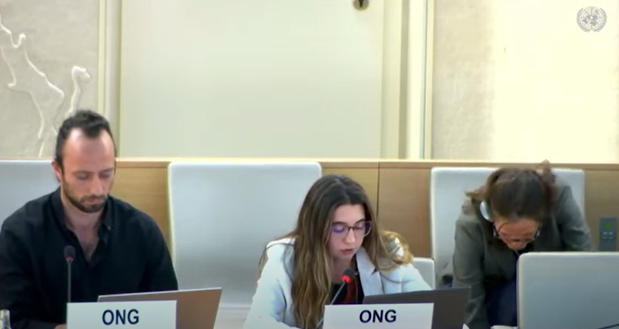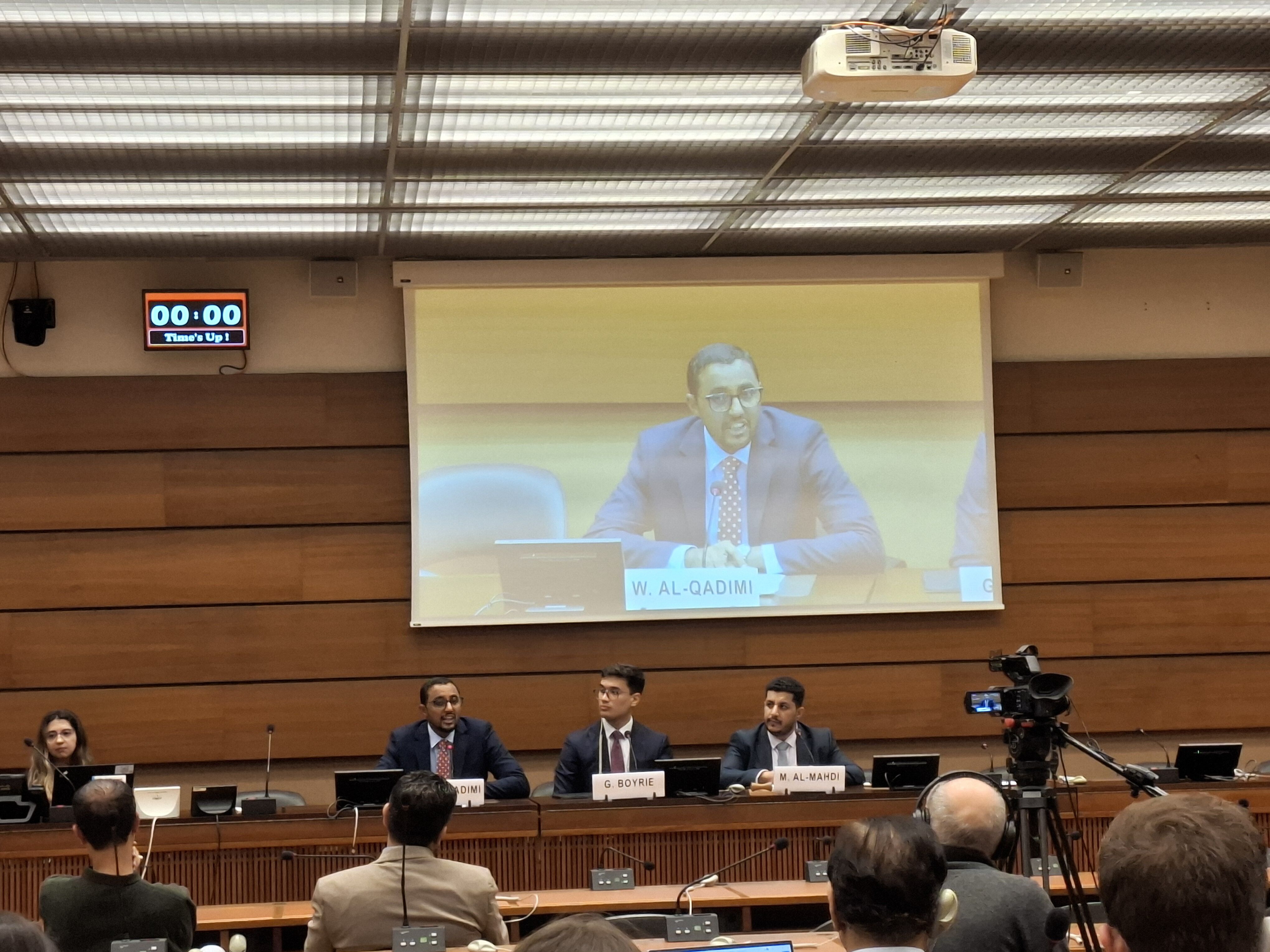HRC55: Insecurity reaches alarming levels in the DRC
The 55th Session of the Human Rights Council
26 February – 5 April 2024
Item 10: Technical assistance and capacity building
Interactive Dialogue on the Oral update on the Democratic Republic of the Congo
2 April 2024
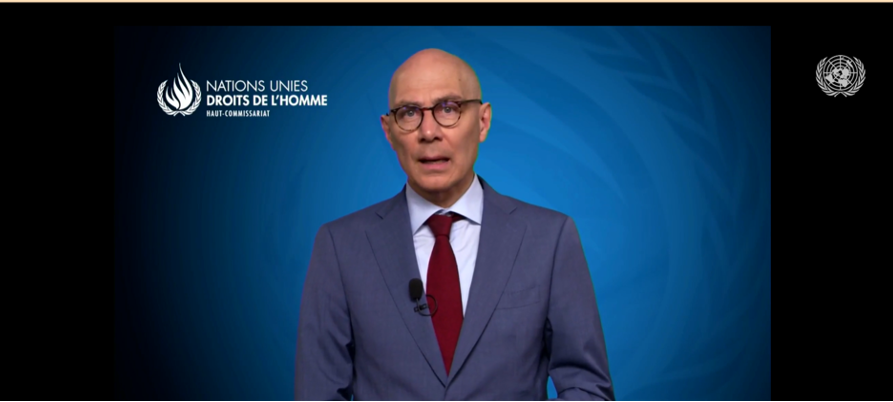
By Patricia Mutebi Jjuuko/GICJ
Executive Summary
The United Nations High Commissioner for Human Rights, Volker Türk, presented his report during the oral update on the human rights situation in the Democratic Republic of Congo in the 55th Regular Session of the Human Rights Council on 2 April 2024.
In his report, Volker Türk voiced apprehension about the armed conflict, particularly in the east of the Democratic Republic of Congo (DRC), that was costing many people their lives. His report highlighted the absence of State authority over large areas opened the way to new brutal levels of violence and attacks. He called on the authorities to assume civilian protection responsibilities and strengthen the national armed forces in the zones where the populations depend on MONOSCO.
Marie-Therese Keita-Bakum, President of the Team of International Experts in the Democratic Republic of Congo noted that the security situation in the east of the DRC, where the M23 attacks have been stepped up, has brought a condemnable aggravation of incidents and led to a massive displacement of the population with the progressive disengagement of MONUSCO. The President recognised the meaningful progress made in the capacity building of the judicial sector, including training the first group of 2,500 magistrates and judges and extending training to forensics.
The Team of International Experts reiterated its call upon the government to materialise its commitment to fight impunity within the armed forces, particularly regarding the attacks by certain members of the security forces.
Geneva International Centre for Justice (GICJ) strongly condemns the human rights violations against the people of the Democratic Republic of the Congo. We are further appalled by the inability of the authorities to protect the civilians in the Eastern part of the DRC and to fight impunity within the armed and security forces. GICJ calls upon the government of the DRC to intensify its endeavours to implement the strategies for transitional justice to make way for the protection of human rights, peace and reconciliation.
Background
The security situation and human rights conditions in the eastern part of the country continue to deteriorate, particularly in Ituri, North Kivu, South Kivu, Maniema and Tanganyika. The humanitarian consequences of the violence affecting civilian populations, particularly children and women, have led to a significant increase in the number of internally displaced persons (IDPs) and persons in need of humanitarian assistance.
The Human Rights Council, in its resolution 54/34, called upon the High Commissioner to provide the Truth, Justice and Reconciliation Commission of Kasai-Central Province with increased support, in particular by making available a team of specialists in human rights, transitional justice, sexual and gender-based violence, victim and witness protection, communication and community mobilisation, and by providing the material and financial resources needed to help it fulfil its mandate within the prescribed time frame. International actors and partners, under the auspices of the Office of the High Commissioner, were called upon to provide the additional financial resources and technical and logistical support necessary for the Government of the Democratic Republic of the Congo to consolidate its efforts in the field of transitional justice.
The High Commissioner and international experts give the current oral update as part of the final report to the Council in the framework of an enhanced interactive dialogue at its fifty-seventh session.
Report of the High Commissioner
 Volker Türk, United Nations High Commissioner for Human Rights, in his statement delivered over video, declared that the ever-present armed conflict, particularly in the east of the country, continues to have a heavy price in terms of human lives since his last update to the Council in October 2022. The High Commissioner was concerned with the new brutal levels of violence and attacks and large-scale corruption among multiple parties seeking control and exploitation of the wealth and natural resources in the country with violent land conflicts.
Volker Türk, United Nations High Commissioner for Human Rights, in his statement delivered over video, declared that the ever-present armed conflict, particularly in the east of the country, continues to have a heavy price in terms of human lives since his last update to the Council in October 2022. The High Commissioner was concerned with the new brutal levels of violence and attacks and large-scale corruption among multiple parties seeking control and exploitation of the wealth and natural resources in the country with violent land conflicts.
He highlighted in his report that between 1 October 2023 and 15 March 2024, the Joint Office of the United Nations for Human Rights documented 2,110 human rights violations and abuses throughout the DRC, including 59% committed by armed groups with summary executions and conflict-linked sexual violence. Half of these violations and abuses were carried out in North Kivu province, where violence and tensions have reached a critical level. Mr Türk pointed out that hundreds of thousands of people have fled towards the provincial capital of Goma and in the north in the province of South Kivu. The conflict has displaced over 2.5 million people in North Kivu between February 2022 and January 2024. The High Commissioner noted that women and girls are once more particularly vulnerable to sexual violence and other forms of sexual abuse and exploitation, particularly in camps for IDPs and around the camps.
The High Commissioner stated that the Joint Office of the United Nations reports that since October, 156 persons were summarily executed by the M23, sexually abused 30 women and 12 children and abducted 127 civilians, intending to force them to conscript for combat. He further noted that the Congolese Army and its agents were responsible for violations of international human rights law and humanitarian law, including summary executions, arbitrary arrests and detentions. He underscored the need for the perpetrators and their accomplices must be brought to account.
Mr Türk pointed out that this year, MONOSCO is starting a disengagement from the country in keeping with the agreement between the DRC Government and the United Nations. He called on the authorities to assume their responsibilities in terms of civilian protection and strengthening the national armed forces in the zones where the populations depend on MONOSCO. He noted that armed groups could take over the security vacuum with terrible consequences for civilians.
The High Commissioner further noted that the tragedy in the DRC will never be resolved by military action alone. Still, time has to be invested in dialogue, restoration and reconstruction of the rule of law, and peace. He echoed that the Nairobi and Luanda processes could silence the weapons and guarantee better civilian protection and sustainable development. He further called on these two processes to be anchored in human rights to combat impunity and guarantee victims' rights to truth, justice, reparation, respect for human rights and guarantee nonrecurrence.
Mr Türk commended the progress made by the DRC in combating impunity, noting that last year, 599 people were brought to justice for human rights violations and abuses by military tribunals. He said with concern, however, that the government has lifted the moratorium on the death sentence and called on the authorities to review this position in line with the commitments undertaken last year at the high-level meeting organised within the Human Rights 75 initiative. He further noted that efforts must be stepped up
to use transitional justice mechanisms to help the country address the crimes and violations of the past.
In closing, the High Commissioner called on the members of the Council to significantly increase their financing and commitment so that the recovery of the people of the Democratic Republic of the Congo can be firmly based on human rights, justice and human dignity.
Report by the Team of International Experts
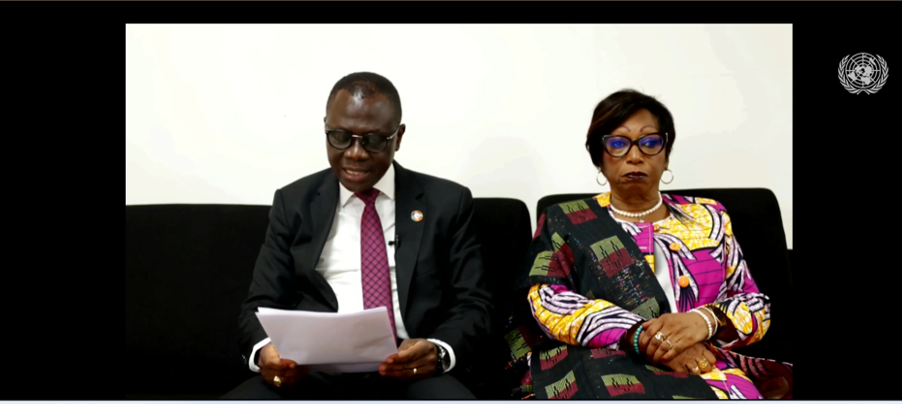 Marie-Therese Keita-Bakum, Chair of the team of international experts in the Democratic Republic of Congo, delivered her statement over video, read by a member of the team. She noted that due to the Secretariat's financial difficulties, the team was unable to travel to the country last year, but exchanges with their interlocutors have allowed them to evaluate the recommendations, particularly in the areas of fighting impunity and promoting reconciliation of transitional justice.
Marie-Therese Keita-Bakum, Chair of the team of international experts in the Democratic Republic of Congo, delivered her statement over video, read by a member of the team. She noted that due to the Secretariat's financial difficulties, the team was unable to travel to the country last year, but exchanges with their interlocutors have allowed them to evaluate the recommendations, particularly in the areas of fighting impunity and promoting reconciliation of transitional justice.
The team of international experts hailed the meaningful progress made in the incapacity building of the judicial sector, including training the first group of 2500 magistrates and judges and extending training to forensics. The team also welcomed the efforts of the DRC legal authorities to close some instances of the crises in the region of Kassai, including the work of two experts, Michael Sharpe and Saidi Karan. It reiterated its call upon the government to materialise its commitment to fight impunity within the armed forces.
The team noted the lack of financing and the reduction in contributions of the international community to the activities of the Commission. They urged the national authorities and the technical partners to endow the commission with the necessary resources. They also called upon the High Commission’s Office to redouble efforts and provide the resources required for transitional justice with the disengagement of MONUSCO. They further hailed the five commitments in the DRC at the 75th anniversary of the Universal Declaration of Human Rights involving women in armed conflict, the economic, social and cultural rights, the situation of women and girls in armed conflict, the strengthening of the protection for civilians and the promotion of transitional justice and strengthening of civic space.
In line with the lifting of the moratorium, the team of experts urged the government to work with partners and continue exchanges in the best interest of protecting human rights and human dignity. They noted that for the protection of human rights, transitional justice of the government should continue to be put into place and strengthened. They further called upon the stakeholders to redouble their efforts to implement the strategies for transitional justice to give the maximum possibilities for the protection of human rights, peace and reconciliation.
Lastly, the team of International experts called upon the armed groups to immediately end their violent activities, the government authorities to continue providing additional security for transitional justice, and the international community to pay particular attention to the concerns and interests of the Congolese population.
Statement by His Excellency Mr Albert Fabrice Puela, Minister for Human Rights of the Democratic Republic of the Congo
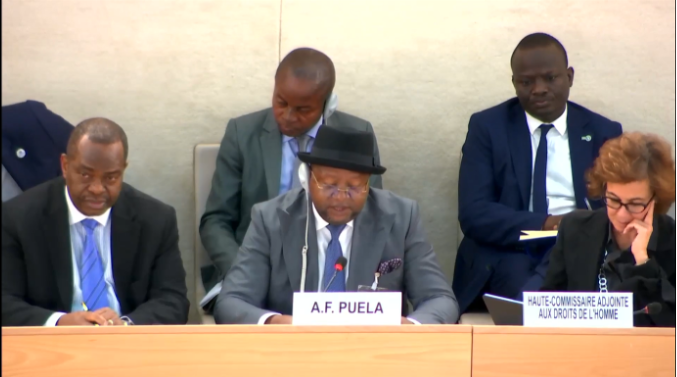 Mr Puela highlighted that the DRC had succeeded in holding its elections at all levels without any problems, and meaningful efforts have been made to honour DRC’s international commitments in promoting and protecting human rights. In the promotion of women's rights and gender equality, the President of the Republic and head of state, a champion of positive masculinity for the first time, named the DRC woman to the post of Prime Minister. Mr Puela underscored that all these efforts were met with ongoing difficulties as a result of the war that was imposed upon him by the negative forces supported by Rwanda. This was reiterated during the mini-summit on the security situation in the east of the DRC on Friday, 16 February, in Addis on the sidelines of the African Union summit.
Mr Puela highlighted that the DRC had succeeded in holding its elections at all levels without any problems, and meaningful efforts have been made to honour DRC’s international commitments in promoting and protecting human rights. In the promotion of women's rights and gender equality, the President of the Republic and head of state, a champion of positive masculinity for the first time, named the DRC woman to the post of Prime Minister. Mr Puela underscored that all these efforts were met with ongoing difficulties as a result of the war that was imposed upon him by the negative forces supported by Rwanda. This was reiterated during the mini-summit on the security situation in the east of the DRC on Friday, 16 February, in Addis on the sidelines of the African Union summit.
The Minister, in his statement, recalled that numerous times UN experts and other independent experts’ reports have shown an involvement of Rwanda in the committing serious human rights violations, humanitarian law, international humanitarian law violations, as well as the pillaging of natural resources in the eastern of the DRC. However, the international community has remained silent. He pointed out the protocol signed on 19 February 2024 between the EU and Rwanda, which unfortunately supports the thesis of a plot against the DRC encouraging the pillaging of DRC's natural resources by Rwanda.
He noted that the war has brought serious consequences, grave consequences including atrocities, international crimes and atrocities and humanitarian crimes, with 10 million dead and more than 7 million IDPs, women and children living in inhumane conditions. The head of state has reiterated his will to speak constructively with Rwanda, but only if there is an immediate cessation of hostilities and immediate withdrawal of the M23 from the occupied areas. The Minister stated that the DRC remains determined to consolidate the transitional justice mechanisms to fight against impunity and to promote a climate of peace, social cohesion and reconciliation.
Statement by Ms Bintou Keita, Special Representative of the United Nations Secretary-General in the Democratic Republic of Congo and head of the MONUSCO
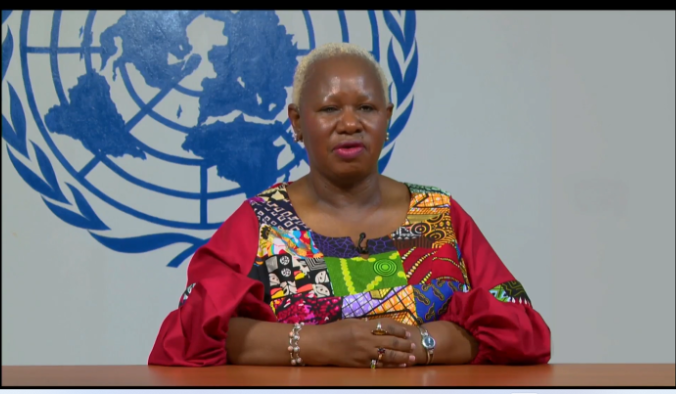 Ms Keita, in her statement, highlighted that the armed violence has worsened in North Kivu and persists in Ituri. The M23, the ADF, and numerous groups continue to commit deadly attacks against the civilian population. In this context, the government has lifted the death penalty, the moratorium on the death penalty, which has been in place since 20O3. The Special Representative to the UN Secretary-General encouraged the authorities of the DRC to review the decision on the death penalty, which is a matter of human rights. She pointed out that the crisis in North Kivu resulted from the increased clashes between M23, who are supported by the Rwandan Armed Forces, and on the other hand, the Armed Forces of the DRC. These armed groups have continued to conquer large areas, and there are serious concerns about the support that the UN and other partners can provide to the civilian population who are waiting for assistance. Ms Keita reiterated that the conflict in North Kivu has led to the massive displacement of 230,000 individuals finding refuge in official sites and spontaneous sites around Goma.
Ms Keita, in her statement, highlighted that the armed violence has worsened in North Kivu and persists in Ituri. The M23, the ADF, and numerous groups continue to commit deadly attacks against the civilian population. In this context, the government has lifted the death penalty, the moratorium on the death penalty, which has been in place since 20O3. The Special Representative to the UN Secretary-General encouraged the authorities of the DRC to review the decision on the death penalty, which is a matter of human rights. She pointed out that the crisis in North Kivu resulted from the increased clashes between M23, who are supported by the Rwandan Armed Forces, and on the other hand, the Armed Forces of the DRC. These armed groups have continued to conquer large areas, and there are serious concerns about the support that the UN and other partners can provide to the civilian population who are waiting for assistance. Ms Keita reiterated that the conflict in North Kivu has led to the massive displacement of 230,000 individuals finding refuge in official sites and spontaneous sites around Goma.
She hailed the arrival of forces from the southern African Development Community in the DRC to protect civilians working with MONUSCO and the DRC. This has allowed for support, strategic support in Goma and North Kivu. Furthermore, the Special representative noted that MONUSCO continues to advance in its coordinated response and sustainable disengagement process as directed by the Security Council through its resolution 27/17 of 19 December 2023. She affirmed that they are working together with all stakeholders to implement the withdrawal of the mission from South Kivu province by 13 June 2024. The start of the second phase of the disengagement in North Kivu will be based on an assessment to be conducted jointly with the Congolese authorities. Ms Keita asserted that the disengagement plan prepared jointly with the government provides a framework for the primary handover of responsibilities and functions from the mission to the government.
The Special Representative reiterated her appeal to the international community to continue to support the national authorities through peace-building mechanisms. She further urged Member States and the council to provide OHCHR's presence in the Democratic Republic of the Congo with adequate financial support, which will secure the continuation of valuable technical assistance provided by OHCHR, including forensic expertise, fight against impunity for serious crimes, transitional justice and reforms, fight against hate speech and ensure the centrality of human rights in the work of United Nations agencies from the program in the DRC.
Statement by Mr Murhabazi Namegabe, Permanent Secretary of the Synergy of Human Rights Organizations in the South Kivu Province
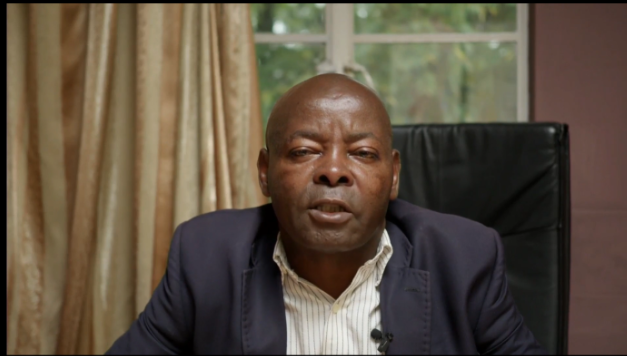 Mr Namegabe, in his statement on the human rights situation in South Kivu, noted that they continue to see violence and human rights violations by numerous large foreign and Congolese armed groups in the province. He highlighted the problematic situation of non-cohabitation that is ethnic and tribal and exacerbated by hate speech, which has endangered important movements of civilian populations that are left to seek the protection of the MONUSCO bases.
Mr Namegabe, in his statement on the human rights situation in South Kivu, noted that they continue to see violence and human rights violations by numerous large foreign and Congolese armed groups in the province. He highlighted the problematic situation of non-cohabitation that is ethnic and tribal and exacerbated by hate speech, which has endangered important movements of civilian populations that are left to seek the protection of the MONUSCO bases.
The Permanent Secretary of the Synergy of Human Rights Organization underscored the lifting of the government's moratorium on the death penalty on 3 March 2024, which is a factor that affects the human rights situation in the DRC. Mr Namegabe on behalf of SODH, recommended that the MONUSCO disengagement does not lead to the UN Joint Bureau for Human Rights departure from South Kivu. Secondly, that financial resources should be allocated to the government of the DRC to restore the rule of law that used to be protected by MONUSCO. He further recommended that there must be an overhaul of the criminal and military courts to bring them into step with the Constitution, which enshrines within it the sacred nature of human life.
Interactive Dialogue
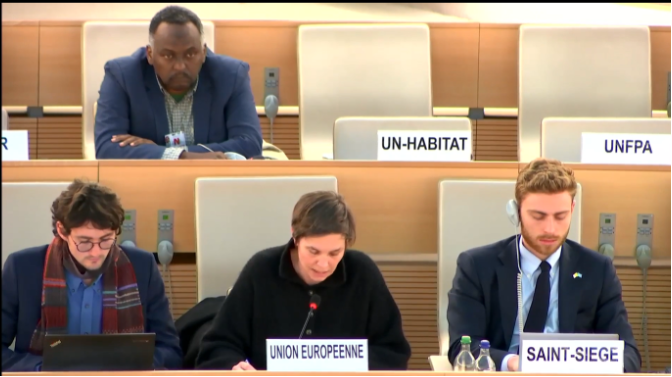 In the ensuing interactive dialogue, the European Union voiced concern about the spiralling violence in the east of the DRC and the worsening humanitarian situation with the M23 offensives. The representative underscored that all parties must do their best to protect civilians, prevent violations of international law and ensure safe, unhindered humanitarian access. The EU reaffirms its strong support to the Luanda and Nairobi processes and reiterates the call to end any support or cooperation with the armed groups, particularly the partnership between Rwanda and the M23, which bears most of the responsibility for the worsening humanitarian situation, particularly around Goma. The EU share the High Commissioner's concern regarding the rising rate of hate speech, ethnically based hate speech and incitement to violence. The EU noted with regret the government's decision to lift the moratorium on the death penalty.
In the ensuing interactive dialogue, the European Union voiced concern about the spiralling violence in the east of the DRC and the worsening humanitarian situation with the M23 offensives. The representative underscored that all parties must do their best to protect civilians, prevent violations of international law and ensure safe, unhindered humanitarian access. The EU reaffirms its strong support to the Luanda and Nairobi processes and reiterates the call to end any support or cooperation with the armed groups, particularly the partnership between Rwanda and the M23, which bears most of the responsibility for the worsening humanitarian situation, particularly around Goma. The EU share the High Commissioner's concern regarding the rising rate of hate speech, ethnically based hate speech and incitement to violence. The EU noted with regret the government's decision to lift the moratorium on the death penalty.
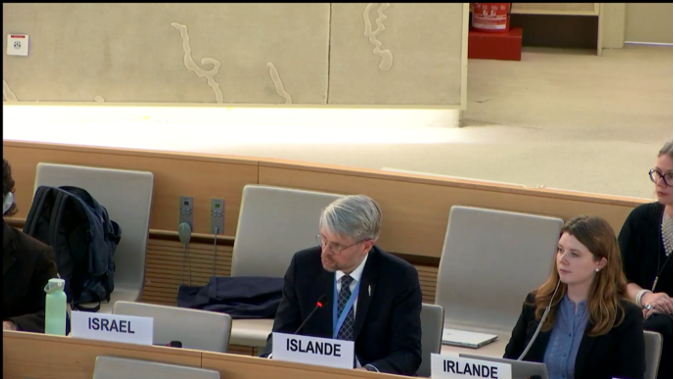 Subsequently, Iceland, on behalf of the Nordic and Baltic countries, highlighted that all states should stop any support to the armed groups. The delegate noted that they are closely following the appeal trial of the murders on the UN expert site in 2017, as well as the investigation into the disappearance of the four Congolese companions. The delegate encouraged the continued cooperation between the Congolese authorities and the UN-mandated follow-up mechanism and further opposed without exception the use of the death penalty in all circumstances.
Subsequently, Iceland, on behalf of the Nordic and Baltic countries, highlighted that all states should stop any support to the armed groups. The delegate noted that they are closely following the appeal trial of the murders on the UN expert site in 2017, as well as the investigation into the disappearance of the four Congolese companions. The delegate encouraged the continued cooperation between the Congolese authorities and the UN-mandated follow-up mechanism and further opposed without exception the use of the death penalty in all circumstances.
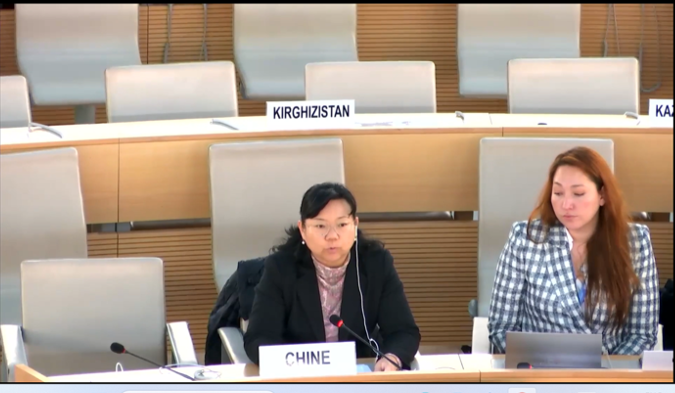 China maintained that technical assistance and capacity building must be provided with the agreement of the concerned country and in accordance with the wishes and the actual needs of its government and people and that human rights should not be used as a pretext for interfering in the internal affairs of any country. China has worked hard to play a constructive role by actively promoting peace and negotiation and participating in regional peacekeeping, which the DRC and the international community highly appreciate. China pledged to work with the international community to continue to play a positive role in promoting peace, development and long-term stability.
China maintained that technical assistance and capacity building must be provided with the agreement of the concerned country and in accordance with the wishes and the actual needs of its government and people and that human rights should not be used as a pretext for interfering in the internal affairs of any country. China has worked hard to play a constructive role by actively promoting peace and negotiation and participating in regional peacekeeping, which the DRC and the international community highly appreciate. China pledged to work with the international community to continue to play a positive role in promoting peace, development and long-term stability.
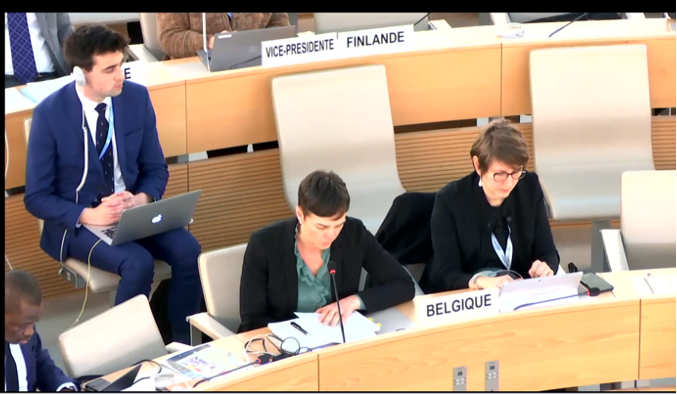 Belgium expressed concern about the restrictions on civil and democratic space in DRC worsening over the recent weeks. They reiterated the importance of protecting the civic and democratic space in the country's east. Belgium regretted the Congolese authorities' decision to lift the death penalty, which has been placed since 2003. They echoed that the death penalty will never be a dissuasive solution to crime, which runs counter to the right to life. They called for the Congolese authorities to reconsider that decision.
Belgium expressed concern about the restrictions on civil and democratic space in DRC worsening over the recent weeks. They reiterated the importance of protecting the civic and democratic space in the country's east. Belgium regretted the Congolese authorities' decision to lift the death penalty, which has been placed since 2003. They echoed that the death penalty will never be a dissuasive solution to crime, which runs counter to the right to life. They called for the Congolese authorities to reconsider that decision.
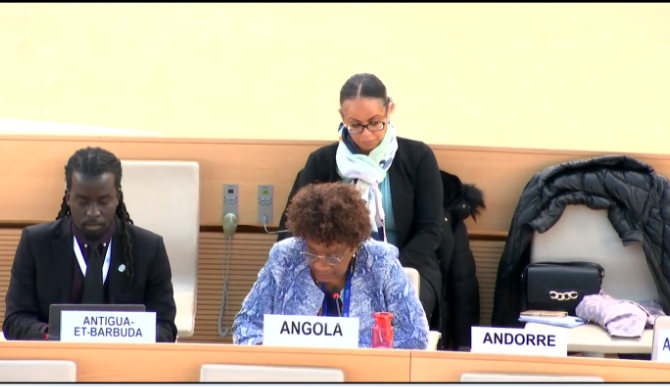 Angola reiterated the importance of the recommendation of the SADC Organ Summit and reaffirmed its multidimensional support for achieving lasting solutions, stability and security in the DRC. Angola emphasised the meaningful role of SADC peace support missions and highlighted the necessity of avoiding negative external narratives that may compromise the success of the entire process. At the bilateral level, Angola recalled that both countries have always sought to implement concerted solutions to address the concerns of refugees and displaced populations within the framework of three-party agreements with UNHCR and the bilateral Joint Commission on Defense and Security.
Angola reiterated the importance of the recommendation of the SADC Organ Summit and reaffirmed its multidimensional support for achieving lasting solutions, stability and security in the DRC. Angola emphasised the meaningful role of SADC peace support missions and highlighted the necessity of avoiding negative external narratives that may compromise the success of the entire process. At the bilateral level, Angola recalled that both countries have always sought to implement concerted solutions to address the concerns of refugees and displaced populations within the framework of three-party agreements with UNHCR and the bilateral Joint Commission on Defense and Security.
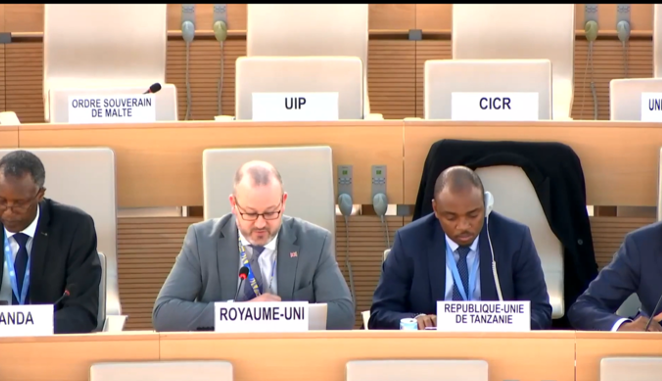 The United Kingdom of Great Britain and Northern Ireland expressed concern about the grave and deteriorating human rights situation in DRC and the continuing reports of violations and abuses. More broadly, the UK is concerned about shrinking civic space in DRC. It urged the government to uphold the civic freedoms enshrined in its constitution, including the freedom of the press, a crucial part of any democratic society. The UK also urged the DRC to reconsider its decision to lift the death penalty moratorium, which unravels decades of positive work in the DRC and demonstrates a lack of value for human life.
The United Kingdom of Great Britain and Northern Ireland expressed concern about the grave and deteriorating human rights situation in DRC and the continuing reports of violations and abuses. More broadly, the UK is concerned about shrinking civic space in DRC. It urged the government to uphold the civic freedoms enshrined in its constitution, including the freedom of the press, a crucial part of any democratic society. The UK also urged the DRC to reconsider its decision to lift the death penalty moratorium, which unravels decades of positive work in the DRC and demonstrates a lack of value for human life.
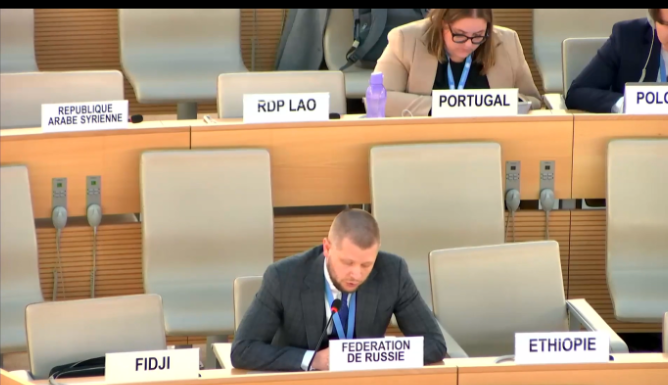 The Russian Federation underscored that a qualitative improvement of human rights in the DRC would be possible only after a permanent settlement of the conflict in the east, a full disarmament of civilians and social reintegration of ex-combatants. They echoed the importance of establishing a constructive dialogue with the authorities of the DRC and providing technical assistance to develop capacities in the human rights field. The Russian Federation emphasised that this must be done without politicisation and with full attention to the national ethnic and cultural features of the country.
The Russian Federation underscored that a qualitative improvement of human rights in the DRC would be possible only after a permanent settlement of the conflict in the east, a full disarmament of civilians and social reintegration of ex-combatants. They echoed the importance of establishing a constructive dialogue with the authorities of the DRC and providing technical assistance to develop capacities in the human rights field. The Russian Federation emphasised that this must be done without politicisation and with full attention to the national ethnic and cultural features of the country.
The United States of America condemned the violence perpetrated by the Rwandan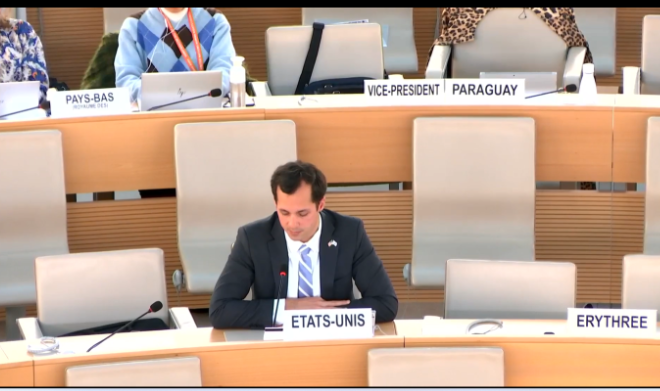 -backed rebel military group, M23, which has resulted in over 1 million additional displaced persons since 2022. They commended the government for its efforts to improve the administration of justice, including the increased recruitment of judges and the trials of two generals for crimes against humanity. However, they remain concerned over the slow pace of justice for survivors and stress the importance of criminal accountability for perpetrators. The United States of America encouraged the government to implement recommendations from the team of experts, including the urgent need for a communication strategy that will raise awareness of the transitional justice policy and empower survivors to take ownership of this critical process.
-backed rebel military group, M23, which has resulted in over 1 million additional displaced persons since 2022. They commended the government for its efforts to improve the administration of justice, including the increased recruitment of judges and the trials of two generals for crimes against humanity. However, they remain concerned over the slow pace of justice for survivors and stress the importance of criminal accountability for perpetrators. The United States of America encouraged the government to implement recommendations from the team of experts, including the urgent need for a communication strategy that will raise awareness of the transitional justice policy and empower survivors to take ownership of this critical process.
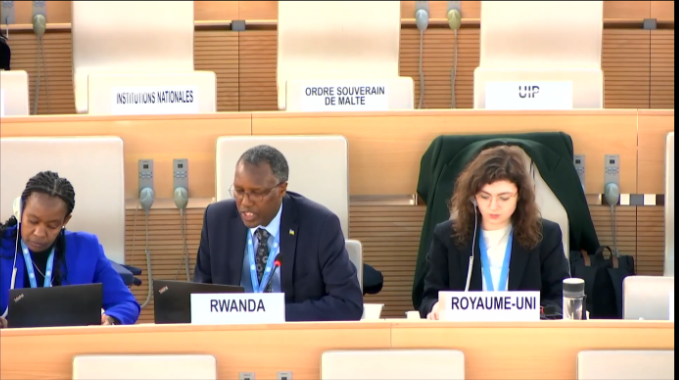 The delegate of Rwanda deplored the grave human rights violations against Congolese communities who are at risk of genocide in Eastern DRC. Rwanda emphasised that the root causes of the conflict in the Eastern DRC can be addressed peacefully under the auspices of Rwanda and Nairobi peace processes. They further underscored that no military solutions will bring about lasting peace in the region.
The delegate of Rwanda deplored the grave human rights violations against Congolese communities who are at risk of genocide in Eastern DRC. Rwanda emphasised that the root causes of the conflict in the Eastern DRC can be addressed peacefully under the auspices of Rwanda and Nairobi peace processes. They further underscored that no military solutions will bring about lasting peace in the region.
NGO representatives deplored the human rights situation in the DRC and expressed grave concern by the DRC government's decision to lift the moratorium on the death penalty. This decision is contrary to Congolese domestic law and to international human rights law. NGO representatives called on states not to backslide in protecting the human rights of the people of the DRC, including human rights defenders and journalists.
Concluding remarks
Mr. Albert Fabrice Puela, in his concluding remarks, thanked the delegates for recognising the clear involvement of Rwanda through M23 in the conflict. Mr Puela gave assurance that the DRC will consider the recommendations that have been made. He regretted the stance of Belgium, which apparently did not have all of the information on the positive developments in human rights and, indeed, civic space in the DRC. He agreed that the death penalty is not necessarily a solution, but strict discipline must be applied.
Mr Patrice Wahab, the representative of the office of the High Commissioner for Human Rights in the Democratic Republic of the Congo, in his concluding remarks, reaffirmed OHCHR’s support for the government’s effort to facilitate access to health services for victims of gender-based violence. The representative expressed his solidarity for the victims of the human rights association and organisation in respect for their courage in the face of continuous violence, particularly in the eastern part of the country. He reiterated that the international community, including members of this council, has the duty to act in support of the DRC authorities to put an end to this violence and to enable the population to enjoy the full spectrum of rights in an immense wealth of this beautiful country.
Position of Geneva International Center for Justice
Geneva International Centre for Justice (GICJ) welcomes the High Commissioner and the team of independent experts for the oral update on the human rights situation in the DRC. We remain concerned, however, by the human rights violations and abuses, particularly in the eastern part of the DRC, committed by armed groups with summary executions and conflict-linked sexual violence. GICJ calls on government authorities to continue to provide additional security for transitional justice and for the international community to provide particular attention to the concerns and interests of the Congolese population. We remain saddened by the current liquidity crisis in the United Nations, which is impacting the Council’s work and human rights mechanisms. Financial support is critical in securing the continuation of valuable technical assistance provided by OHCHR, including forensic expertise, fighting against impunity for serious crimes, and transitional justice.
GICJ acknowledges that there is no military solution to the conflict in the DRC and calls upon the inclusive dialogue between DRC, M23 and other relevant state parties to address the root causes of the conflict. We further urge all parties involved to strive to protect civilians and prevent violations of international law. GICJ calls upon the government of the DRC to consider aboloshing the death penalty, which has been in place since 2003. The death penalty is a breach of human rights, particularly the right to life and the right to live free from torture.




